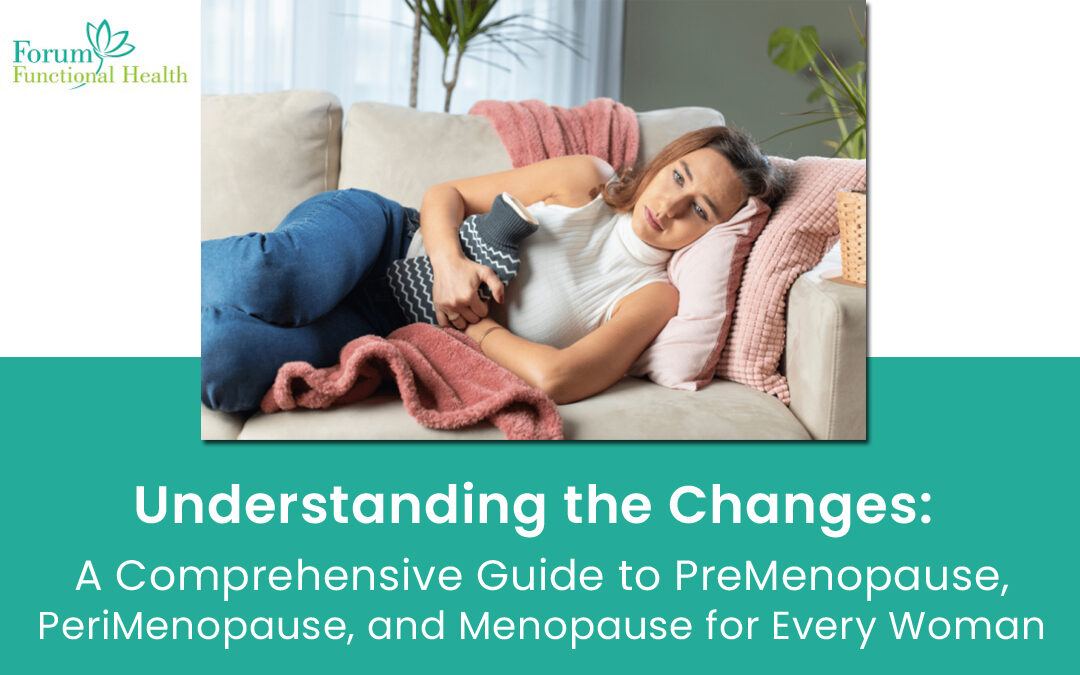As journey through life, Women go through different stages in life that shape our bodies and our experiences. One of the most significant stages is menopause, which marks the end of our reproductive years. But before we reach menopause, we often experience premenopause and perimenopause, which can bring along a host of changes and symptoms.
Understanding these stages and the changes that come with them is crucial for every woman. This comprehensive guide will provide you with the knowledge and insights to navigate premenopause, perimenopause, and menopause with confidence and grace. From understanding the hormonal shifts to managing common symptoms, this guide is designed to empower you to take control of your health and well-being during this transformative time.
What is PreMenopause and why should you know about it?
PreMenopause is the first stage of the menopause transition and typically begins in a woman’s late 30s or early 40s. During this phase, the production of estrogen and progesterone starts to fluctuate, leading to irregular menstrual cycles and various symptoms. It is crucial to understand premenopause because it sets the foundation for the changes that will occur in the following stages.
Knowing about premenopause allows you to recognize and differentiate between normal hormonal fluctuations and potential health concerns. By familiarizing yourself with the signs and symptoms of premenopause, you can seek appropriate medical advice and make informed decisions about your reproductive health. PreMenopause is a unique journey for every woman, and being aware of it helps you navigate the changes with more ease and confidence.
Navigating the challenging phase of PeriMenopause with grace
PeriMenopause, also known as the transitional phase, is the second stage of the menopause journey. It typically starts in a woman’s late 40s or early 50s and can last for several years before reaching the final stage of menopause. During this phase, the hormonal changes become more pronounced, and women may experience a variety of physical and emotional symptoms.
Understanding PeriMenopause is essential as it allows you to prepare yourself for what lies ahead. By recognizing the signs of PeriMenopause, such as hot flashes, mood swings, and irregular periods, you can better manage these symptoms and seek appropriate support from healthcare professionals if needed.
Understanding Menopause: The end of fertility, but not the end of life.
Menopause is the final stage of the menopause journey and signifies the end of a woman’s reproductive years. It is a natural biological process that all women will experience, typically occurring in their late 40s or early 50s. While it may mark the end of fertility, it is important to remember that it does not signify the end of life.
During menopause, the ovaries gradually stop producing eggs, causing a decrease in hormone production, particularly estrogen and progesterone. As a result, women may experience a range of symptoms including hot flashes, night sweats, vaginal dryness, mood changes, and sleep disturbances. These symptoms can vary in severity and duration from woman to woman. Understanding menopause is crucial as it allows women to better navigate this life transition and seek support if necessary.
Finding support during these difficult times.
Navigating the changes during premenopause, perimenopause, and menopause can be challenging and overwhelming at times. It’s important to remember that you don’t have to face this journey alone. There are numerous resources and support systems available to help you through these difficult times.
One of the first steps to finding support is reaching out to your healthcare provider. They can provide you with medical guidance, offer treatment options, and address any concerns or questions you may have. Additionally, many organizations and online communities cater specifically to women going through menopause. These forums can be a great source of knowledge, encouragement, and connection with others who are experiencing similar symptoms and emotions.
It’s also important to lean on your friends and loved ones for support. Opening up about your experiences and sharing your feelings can help alleviate some of the emotional burden that often accompanies menopause. Surrounding yourself with a strong support system can make a significant difference in how you navigate this transformative phase of womanhood.
Remember, seeking support is a sign of strength. Embrace resources around you, and don’t hesitate to reach out. At our Forum Functional Health Center, we assess hormonal, gastrointestinal, and detoxification systems. Correcting these systems and adjusting lifestyle habits often eliminates perimenopause or menopause symptoms, empowering you to thrive.
Taking charge of your health during hormonal changes
Taking charge of your health during hormonal changes is crucial for navigating through premenopause, perimenopause, and menopause. Prioritize regular check-ups with your healthcare provider to monitor hormone levels and address symptoms effectively. Incorporate a balanced diet, exercise regularly, and stay hydrated to manage symptoms and support overall well-being. Finally, embrace self-care and stress-management techniques to nourish your mind and body, promoting emotional resilience through this transformative phase.
Understanding the transformations in premenopause, perimenopause, and menopause empowers women. Taking charge of health through regular check-ups at Forum Functional Health Center ensures proper monitoring and tailored therapies. A healthy lifestyle, encompassing exercise, balanced nutrition, and stress management, significantly aids in managing hormonal changes. Embrace this natural phase, celebrate strength, and foster resilience with knowledge and nourishing choices for a vibrant future

